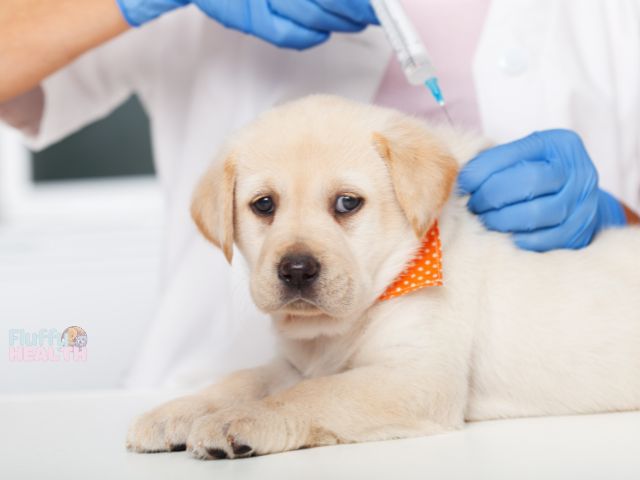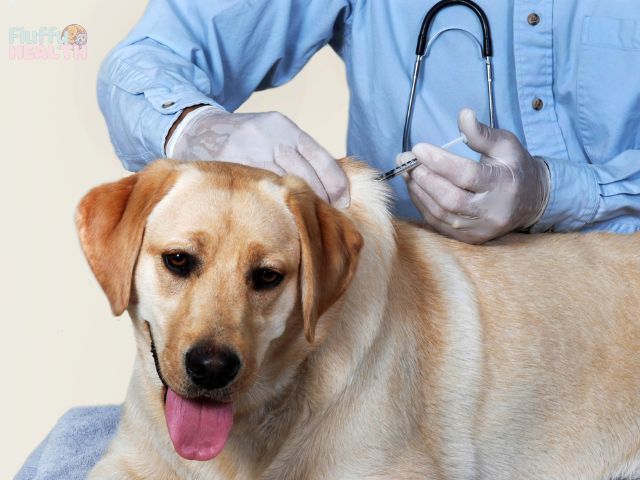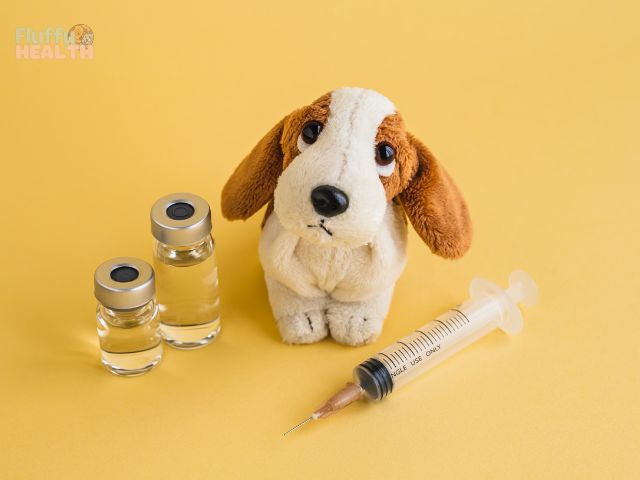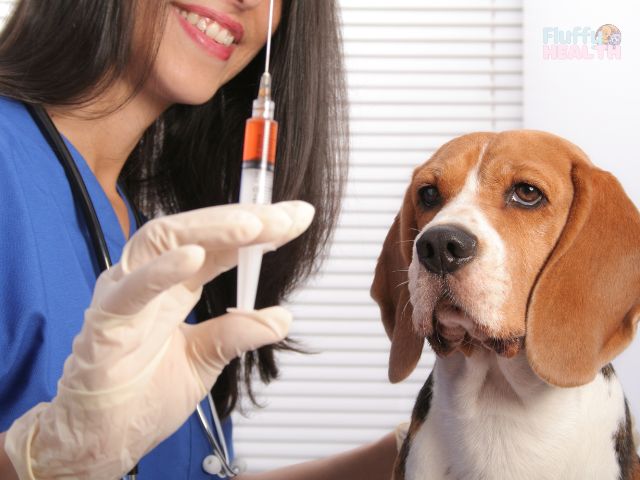Are dog vaccines necessary? Which dog vaccines are absolutely necessary? Well, you’re not alone in asking these questions and more. It is, without a doubt, just like human vaccinations, required to give our pets vaccines against serious diseases. Dog vaccines are essential in preventing serious diseases and keeping your furry friend healthy.
As we will mention later, puppies need certain vaccinations from their first few weeks to protect them against diseases like Distemper, hepatitis, and even rabies. It’s all about giving your pup what is necessary for the immunity they need against serious, sometimes fatal illnesses.
Today, I want to talk about everything you need to know about dog vaccinations. We’ll discuss what vaccines are made of, how they work, and which ones are absolutely necessary for your dog. By the end of this article, you’ll be well-prepared to discuss your dog’s vaccination needs at your next vet visit, making sure your beloved dog is protected for all of its life.
Without any further delay, let’s begin by discussing dog vaccination and its contents.
Table of Contents
What Exactly Are Dog Vaccinations and What’s Inside Them?
Alright, let’s talk about dog vaccinations. You might be asking yourself, “What exactly is a vaccine?” Well, to make it simple, think of it as a short training course session for your dog’s immune system to deal with a new crime method. A vaccine itself is a biological preparation that helps your pup’s body recognize and combat “new” infections. Remember, when your puppy is born, its body still does not know these infections or how to deal with them yet.
These vaccines contain agents that mimic disease-causing organisms but don’t actually cause the disease. These agents can be a killed or weakened form of the microbe, tricking the dog’s immune system into thinking it’s under attack.
This mock drill prepares your dog’s immune system to recognize and fight off the real deal if it ever encounters it. The cool part? The immune system remembers this invader and saves it as a memory, so it’s ready to run into action faster and more effectively once the body is infected.
So, how does this relate to your dog? Just like vaccines for humans, dog vaccines are important for their immune systems to protect them against serious infections they might face in their lives. When your dog gets vaccinated, its immune system gets to practice its defense against a weakened version of the disease, meaning if the real infection shows up, your dog’s body is prepped to fight it off or at least mitigate its effects.
This simple prevention can make a huge difference in keeping your dog healthy and, therefore, happy.

The Most Important Vaccines For Your Dog
When it comes to keeping your dog healthy, knowing the most important vaccines is the first step to protect your dog. Here’s a list of dog vaccines needed with a more detailed look at each disease and the essential vaccines that help combat them:
- Parvovirus: Highly contagious and often fatal, especially in puppies, Parvovirus attacks a dog’s intestines, causing severe vomiting, diarrhea, and dehydration. Vaccination has been proven to significantly reduce the incidence of this disease, which can spread quickly in unvaccinated dogs.
- Distemper: This virus is a serious threat to dogs, affecting their respiratory, gastrointestinal, and nervous systems. Symptoms include high fever, discharge from the eyes and nose, coughing, lethargy, reduced appetite, vomiting, and in severe cases, seizures. The distemper vaccine is considered a core vaccine and is highly effective in preventing this potentially deadly disease.
- Parainfluenza Virus: This virus contributes to kennel cough and is covered by the DHPP vaccine (Distemper, Hepatitis, Parainfluenza, and Parvovirus). It’s especially important for dogs that are regularly exposed to other dogs in kennels or social meetings.
- Hepatitis (Canine Adenovirus Type 1): This virus can lead to severe liver diseases and is transmitted through the feces, urine, blood, saliva, and nasal discharge of infected dogs. The vaccine for hepatitis is also included in the DHPP vaccine and is known for its effectiveness.
- Leptospirosis: This bacterial infection can be fatal and affect the kidneys and liver. It is zoonotic, posing a risk to human health as well. The leptospirosis vaccine is recommended for dogs at risk of exposure to wildlife or standing water where the bacteria may thrive.
- Kennel Cough (Bordetella bronchiseptica): The Bordetella vaccine is highly recommended for dogs that are boarded, attend daycare, or are frequently in contact with other dogs. It’s effective in reducing the intensity and duration of kennel cough if contracted.
- Coronavirus: This virus affects dogs’ gastrointestinal systems, causing diarrhea and vomiting. The coronavirus vaccine is optional but may be recommended in environments with high dog density.
- Canine Influenza: This respiratory infection can lead to severe pneumonia. There are vaccines available for the two strains of canine influenza (H3N8 and H3N2), which are recommended for dogs in frequent contact with other dogs.
- Rabies: One of the most well-known vaccinations for dogs, rabies is fatal and zoonotic. The rabies vaccine is legally required in many areas because it is 100% fatal once symptoms appear but 100% preventable with vaccination.
- Lyme Disease: Caused by the bacteria Borrelia burgdorferi, transmitted via ticks. Vaccination is recommended for dogs in areas where Lyme disease is common, as it can lead to joint swelling and kidney problems.
As you read, each vaccine plays a vital role not just in protecting your individual dog but also in maintaining the health of other pets and human populations. By keeping your dog up-to-date with its vaccinations, you’re contributing to a larger community health effort.
Core vs. Non-Core Vaccines: What Your Dog Really Needs
Understanding and knowing the difference between core and non-core vaccines is essential when deciding what vaccinations your dog needs to stay healthy. These categories help us address the vital question: Which dog vaccines are absolutely necessary??
Core Vaccines: Essential For Every Dog
Core vaccines are recommended for all dogs due to the universal risk of exposure, the severity of the diseases they prevent, and their potential to transmit to both dogs and humans.
Here are the core vaccines recommended by The American Animal Hospital Association (AAHA):
- Canine Parvovirus: Highly contagious and often fatal, especially in puppies, Parvovirus has a survival rate that can be as low as 10% in untreated cases. Vaccination has been shown to improve survival rates dramatically, making it nearly essential for all dogs.
- Canine Distemper: Distemper is a serious disease that affects a dog’s respiratory and nervous systems. Historical data shows that before the vaccine was available, Distemper was a major cause of death in dogs. Today, vaccines have reduced their prevalence significantly.
- Hepatitis: This virus can cause severe liver damage and is transmitted quite easily among dogs. Vaccination reduces the risk of acute liver failure and has been key in decreasing the incidence of the disease in canine populations worldwide.
- Rabies: Rabies is fatal but entirely preventable with vaccination. Most jurisdictions require rabies vaccinations by law due to the risk to human health. Over 95% of rabies cases in humans come from dog bites in countries where dog vaccinations are not widespread.

Non-Core Vaccines: Tailored to Your Dog’s Exposure Risks
Non-core vaccines are recommended based on a dog’s specific risk of exposure to certain diseases, which can vary by geography and lifestyle.
- Canine Influenza: Dog flu outbreaks have become more frequent in recent years. Vaccination is especially important in communities where outbreaks have occurred, reducing the spread and severity of the disease.
- Bordetella (Kennel Cough): In facilities where dogs are in close contact, such as kennels and doggy daycares, up to 20% of dogs can be affected without proper vaccination protocols.
- Leptospirosis: This bacterial disease is more common in wet climates and rural areas where dogs might encounter wildlife. Vaccination can prevent leptospirosis, which is treatable but can be fatal in about 10% of cases if not caught early.
- Lyme Disease: In areas where Lyme disease is common, up to 75% of unvaccinated dogs can test positive for exposure to the disease. Vaccination significantly reduces the chances of developing symptoms.
By understanding the risks and benefits of each vaccine type, you can make informed decisions that best protect your dog based on its individual needs and environment. Proper vaccination not only protects your dog but also helps control diseases that can affect other dogs and humans alike.
When? Dog Vaccination Schedule
Getting a new puppy is exciting, but it also comes with big responsibilities, like keeping up with its vaccination schedule. It’s not just about protecting your new family member; it’s also about safeguarding everyone around them.
As we discussed before, Puppies, before the age of 6-8 weeks, need their mother’s milk to boost their immune system and protect them from infections. However, after this period, they need vaccines to stay protected. That is why we start vaccination for puppies at the age of 6-8 weeks by giving them the first combination of vaccines, and later, they need more combination vaccines at around 12 – 16 weeks.
That means as soon as you bring your puppy home, you need to arrange an appointment with professional healthcare to check the general health of your puppy and check which vaccinations it has and needs. Your vet will provide instructions and a Puppy Vaccination Schedule. You need to know when each vaccine should be given, and it can vary depending on your dog’s breed, size, and health problems.
Puppy Vaccination Schedule can be slightly different from place to place, but it is nearly the same.
Puppy Vaccination Schedule
From birth, puppies rely on their mother’s milk for early immunity against diseases. This natural protection is vital but temporary. That’s why starting vaccinations at the right time is very important:
- 6-8 weeks: Puppies should receive their first combination vaccine. This includes protection against Distemper, Hepatitis, Parvovirus, Parainfluenza, and Coronavirus.
- 9 weeks: Time for the second round of the combination vaccine to boost the initial dose’s effectiveness.
- 12 weeks: They receive the third combination vaccine. Around this time, it’s also appropriate to start the Lyme Disease vaccination, followed by a booster two weeks later and then annually.
- 11-14 weeks: Depending on the vet’s assessment, this period might include vaccines for DHPP (Distemper, Hepatitis, Parvovirus, Parainfluenza), Leptospirosis, Canine Influenza, and Lyme Disease.
- 15-16 weeks: Puppies receive another round of DHPP, Leptospirosis, Canine Influenza, Lyme Disease, and their first Rabies vaccine.
Some puppies may require additional parvovirus vaccinations after 15 weeks, especially if they had health issues or started their vaccine schedule late. Always consult with your vet to tailor the vaccination plan based on your puppy’s specific needs and risks.
Adult Dog Vaccination Schedule
Once your puppy becomes an adult, the vaccination schedule shifts from building immunity to maintaining it:
- Annual boosters for Distemper, Parvovirus, and Hepatitis: Recommended at least for the first three years after completing the puppy vaccination schedule.
- Parainfluenza: Every three years, a booster can help maintain immunity.
- Kennel Cough: A booster every six months may be advised in high-risk environments, such as boarding facilities or dog parks.
- Lyme Disease: An annual booster before tick season is a must in areas where ticks are prevalent.
- Leptospirosis: Yearly vaccination is recommended, for dogs exposed to wildlife, standing water, or other high-risk environments.
- Canine Influenza: Annual vaccination is suggested for all dogs, for those in frequent contact with other dogs.
Following these schedules not only keeps your dog healthy but also minimizes the risk of disease spreading to other animals and people. Remember, your dog relies on you to make the best decisions for its health. Adhering to these vaccination schedules is a major part of being a responsible dog owner.
How Long Do Dog Vaccinations Last?
Many pet owners wonder, “How long will my dog’s vaccinations last?” It’s an important question. Knowing how long vaccines last helps plan future shots. Here’s a simple guide on how long each common vaccine protects your dog:
- DHPP (Distemper, Hepatitis, Parvovirus, Parainfluenza): This core vaccine offers protection for about 3 years. After the initial puppy dose, your dog will need a booster at one-year-old and then every three years following.
- Rabies: One of the most important vaccines, given its legal requirements and public health implications, the rabies vaccine generally provides protection for 3 years. However, some jurisdictions may require more frequent vaccinations, so it’s important to check local regulations.
- Leptospirosis: Because leptospirosis is a bacterial disease, the vaccine only provides protection for about 1 year. Annual vaccination is recommended, especially if your dog is in areas where the risk of encountering Leptospira bacteria is high.
- Canine Influenza: This vaccine also requires annual boosters to maintain immunity, particularly in areas where outbreaks are common or if your dog regularly interacts with other dogs.
- Lyme Disease: Also requiring annual boosters, the Lyme disease vaccine is essential for dogs in tick-prone areas to help prevent the transmission of Borrelia burgdorferi from ticks.
- Kennel Cough (Bordetella): Often recommended every 6 months for dogs that are frequently in contact with other dogs in places like kennels, dog shows, or dog parks. This vaccine is important for preventing outbreaks of this highly contagious respiratory disease.
How Are Dog Vaccines Administered? Different Methods Explained
Most vaccines are given via injection, but the method can be different depending on the type of vaccine:
- Subcutaneous Injections: The majority of dog vaccinations are administered subcutaneously, which means they are injected just under the skin. This is typically done in the loose skin around the neck or between the shoulder blades. Vaccines like DHPP (Distemper, Hepatitis, Parvovirus, Parainfluenza) and Rabies are commonly given this way.
- Intramuscular Injections: Some vaccines might be administered as an intramuscular injection, which means the vaccine is delivered directly into a muscle. This method is less common but can be used for certain types of vaccines.
Nasal Sprays: Vaccines for kennel cough, like the Bordetella vaccine, are given as a nasal spray. This method works fast. It helps your dog’s nose fight off bad germs right away.
It’s very good at stopping respiratory pathogens. The nasal spray vaccine also keeps your dog safe for a long time.
Each method of administration is chosen based on how it best allows the vaccine to stimulate the immune system effectively and safely. When scheduling your dog’s vaccinations, your veterinarian will explain how each vaccine will be administered and what you can do to make the process as smooth and stress-free as possible for your pet.
Understanding Dog Vaccine Side Effects: Safety Over Fear
As a dog mom or dad, you might be worried about side effects from dog vaccinations; it’s completely understandable to feel a bit anxious. Let’s talk about what you might expect and why the benefits of vaccinations far outweigh the risks.
First off, it’s pretty rare for dogs to have serious reactions to vaccines. Most of the time, if there are any side effects at all, they’re really mild. Here are some symptoms you might notice:
- Mild Reactions: Your dog might feel a bit off for a day or two. it could have a slight fever, feel sluggish, or lose their appetite. You might also notice a bit of swelling at the injection site, or they could have a mild upset stomach and it will subside within few days.
- Allergic Reactions: On very rare occasions, a dog might have an allergic reaction. This can include symptoms like significant swelling around the face or paws, hives, or even more severe symptoms like difficulty breathing, collapsing, or seizures. These are signs of anaphylactic shock, which is serious but extremely rare.
Remember, these side effects are not common, and when they do happen, they’re generally very mild and disappear fast. The real goal here should be that the protection your dog gets from vaccinations against diseases like rabies, distemper, and parvovirus, diseases that can be dangerous and even life-threatening is invaluable.
So, while it’s good to be aware of what to look out for, it’s also important to keep in mind that vaccinations are an important part of keeping your dog healthy. If you ever notice anything that concerns you after your dog gets vaccinated, don’t hesitate to call your vet. They’re there to help your pup stay healthy and happy.

Are Dog Vaccines Necessary? The Conclusion
And there you have it! Now after we’ve got a clear answer to today’s questions, “Are dog vaccines necessary? Which dog vaccines are absolutely necessary?” Just like we try our best to protect our kids against various diseases, it’s just as important to do the same for our pets.
Vaccinations are’t scary they are like having a little chat with your dog’s immune system, telling it to gear up for any potential threats. This preperation is essential to keep them healthy throughout their lives. By staying on top of your dog’s vaccination schedule, you’re preparing a strong defense against future risks, keeping your dog safe from harm.
I hope this article helps you see how vaccinations aren’t just a medical necessity; but they’re an act of love. They keep our “new kids”, as I like to call our beloved pets, protected just like any other family member.
I personally feel relieved knowing that my pet is vaccinated, which lets me sleep peacefully at night without worry.
Remember, keeping your dog vaccinated is important as a dog owner. It will keep both your home and your heart remain happy and healthy spaces for everyone, especially for that precious, loyal friend who greets you at the door each day.


well done Dr.mohammad .. keep it up .. the best for u
Thank you very much! I will keep doing my best.
Thanks for the information .. very healpful … great site??
Thank you, I am glad that you found it helpful.
Hello. Thank you for writing about such an important topic.
I just wanted to comment that the initial “puppy” series which should have at its heart Distemper, Hepatitis and Parvovirus should absolutely be continued through 16 weeks of age.
This is to prevent interference with vaccines from maternal antibodies obtained at birth.
Finally serious consideration must be given specifically for Rottweilers and Dobermans to an additional DHP vaccine at 18 weeks of age. These breeds have a genetically increased susceptibility to Parvovirus.
Also note that Parainfluenza is a “non-core” vaccine. As such, I vaccinate puppies with a DHP vaccine, rather than the DHPP vaccine, which is combining core and non-core antigens into one vaccine.
Keep up the good work!
Colin Chaves, DVM
Yea it is an important matter and people should try to focus on this more and solve this problem.
Thank you very much and I am glad to enjoyed reading it
I’ve had dogs my entire life and always keep their vaccinations up to date. Many (if not most) kennels or dog groomers won’t even allow you to leave your pet with them if you don’t show them proof that they have had their shots. I think that’s a good policy, because it only takes one infected pet to cause an outbreak, and if all the other dogs were unprotected, the results could be tragic. I’d rather not take any chances on the health of my dog. That’s how I return the love of my best friend.
I agree with you, it is a great policy, like that every dog going to be healthy and prevent any infection!
Thank you for your informative post. It’s been a fear for me always to have a dog, specially while I’m travelling because it’s easier for them to get sick. But you have clarified that there is no need to be afraid while vaccinations protect the dogs against killer diseases and they are likely to be a requirement if the dog goes into boarding kennels or travels abroad with you. Each injection can contain up to several vaccines against different diseases. That’s great to know all these information!
I am glad that this post is so useful for you! and I hope you have a great and healthy happy life with your future pet! It is a great thing to have a pet beside you.
A great post Mohammed. There are many people who do not realize the potential harm they are doing to their dogs and puppies by not having them vaccinated regularly.
I think this is something that too many owners overlook, possibly in the hope it won’t affect their dog.
Thank you for this in-depth view of what dog owners should be doing.
Derek
Thank you very much, and you got it right, Sadly so many people overlook such important matter but hopefully by the time they learn how important vaccines are to protect their dogs that became part of their families.
I am glad you enjoyed reading my post and found it useful.
The puppy vaccination schedule is a helpful piece of information. We’ve always given most of the vaccinations you discussed. Although we’ve never given the Canine Influenza vaccination.
There are a lot of vaccinations to give in the first 4 months of a puppy’s life. How much can I expect to pay the vet for all those vaccinations? That’s a cost many people may not consider when purchasing a new puppy.
it is difficult to determine how much you are going to pay for all of them because it depends on the country itself and on your vet. but you should ask yourself this, Is it worth it? When your Children need this kind of medical care the last thing you think about is money and since your dog now is part of your family I believe you will have the same feeling. It is always good to ask your vet about the prices for all of them so can be prepared for it too.
Thank you for this very comprehensive post on the importance of vaccination and what vaccines you should get. I do have one question: I notice you have divided these vaccines into “core” and “non-core” vaccines, and then have shown suggested schedules for them both. I understand that the “core” ones are must-haves, but what about the “non-core”? Can some of those be left out depending on the area you live in?
I do appreciate the information and think it will be helpful to many people, especially new owners of dogs.
Even though they are not “Core” vaccines they are considered very important as a prophylactic for the dog to protect them from these diseases. Note that nowadays veterinarian prefers to give dogs both Core and Non-Core Vaccines to keep dogs as healthy as possible. However, it is always preferable to consult your veterinarian about Non-Core vaccines as your dog might not need one or more of them and that means it is not necessary anymore and your dog can stay healthy as any other dog even without one of them. But remember to never skip the Core vaccinations.
This is quite an informative topic. We’ve had a few family dogs and I must admit that we haven’t taken very good care of them in the past. We usually get puppies from other families and probably they haven’t suckled enough to get the antibodies they need.
Luckily, our dogs have not fallen ill. But I think it is time to vaccinate them. Since they are adults now, will the adult vaccination only be enough?
I am thinking of the more common threat like rabies.
Thank you for this useful post.
If your dog did not take vaccines in its early life as a puppy then it is always better to let your veterinarian know and check your dog health in general and start giving your dog vaccinations like Rabies to prevent such disease to hit your dog and keep it healthy. The most important to focus on is the Core Vaccinations (Rabies one of them) which is really important to discuss with the healthcare professional about. And remember this, it is always better to take vaccines even if it is late than never take them especially against diseases like Rabies and as I pointed out in the article the vaccine for Rabies.
I am glad you found it useful.
Hi, I love this post and. Very informative and I must say, I have gotten some wisdom today. Getting ready to give my dog some vaccine. lol.
Hello, I am glad you found it useful and that is amazing! keep your dog healthy and happy.